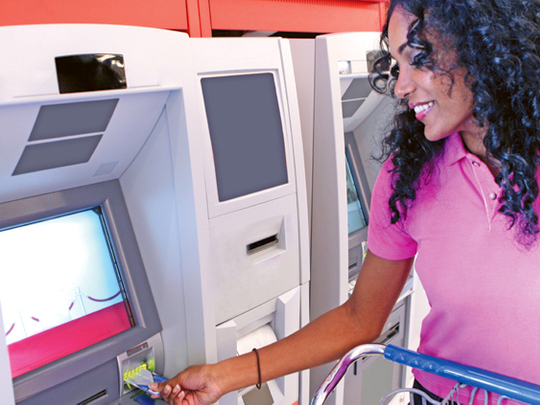
Obtaining cash easily when travelling abroad is now much easier with credit, ATM or debit cards. In many cases, consumers using these may incur extra charges or find out that their cards do not deliver the same suite of services like they do back home. Here are some ways a traveller can avoid these problems.
Get a chip: Thanks to a recent European Payment Council resolution restricting the use of magnetic strip credit cards, frequent travellers to Europe are aware that many merchants are now asking for cards embedded with a chip and authenticated by a PIN or some form of identification.
EMVCo, the EMV standards body collectively owned by American Express, JCB, MasterCard and Visa, is a global standard for credit and debit payment cards based on chip card technology. According to statistics released by EMVCo, as of Q3 2011, there were more than 1.34 billion EMV compliant chip-based payment cards in use worldwide.
Widely perceived as more secure, chip and pin or EMV-enabled, credit, debit and prepaid cards are perfectly poised to immigrate onto the UAE’s payments landscape.
The adoption rate in Africa and the Middle East is 20.2 per cent (global average 42.4 per cent), with a total of 25,882,716 cards, even as 380,000 terminals are equipped to read EMV cards, with an adoption rate of 66.4 per cent (global average 75.9 per cent). The figures represent statistics from American Express, JCB, MasterCard and Visa, as represented by their member financial institutions.
According to the timetable for compliance, from March 31, 2012 onwards all terminals adopted EMV standards. The deadline for compliance on all ATMs, prepaid and debit cards is December 31, 2012, while credit cards have until December 31, 2014.
Carry a spare: Dubai may be one of the world’s safest cities, but travellers should always be prepared for the worst. In case of a loss or a theft, it helps to have an extra card to pay hotel bills or withdraw cash. It is best to keep this card locked in a hotel safe along with a little cash so that you don’t lose both cards at once.
Check in with your bank before departure: Banks advise customers to intimate them when travelling abroad, especially to new or unusual destinations. This is to avoid triggering a fraud alert and leaving the customer with a card that has been cancelled.
Check transaction fees: Enquire with your bank how much they charge for transactions conducted abroad. According to the Pew Charitable Trusts, an American charity that provides grants to improve public policy and inform the public, many US card issuers charge between 1 and 3 per cent per purchase when used outside the issuing country. Most of the UAE banks do not charge this fee, but savvy travellers should ascertain the facts before departure.
Pay in local currency: When making a purchase, travellers using Visa and MasterCard-branded products are often asked if they would like to pay in their home currency. A feature called dynamic currency conversion makes this possible, but high fees make it prudent to refuse this offer, even though it may be tempting to settle bills in a familiar currency, advises the credit card resource cardhub.com. Unscrupulous merchants will charge high exchange rates to do the conversion — as high as 7 per cent — and then keep the difference as a fee.
Check the exchange rate before landing: It helps to know how much money you are likely to require for taxis and other incidental payments when you land. An ATM will not recognise dirhams, so it's best to make a rough estimate to avoid keying in figures that are too low (in Japan, where Dh100 is about JPY 2,130) or too high (in places such as Bahrain, where the same amount fetches BD10.2).
Read the guidebook: In the age of the smartphones with apps offering maps, call taxis and sourcing the best restaurants, most travellers ignore the guidebooks. These often feature a finance or money section which identifies local differences. In some countries, many ATMs do not accept foreign bank cards and it can be hard to find one that does when asking for directions in a strange language.








